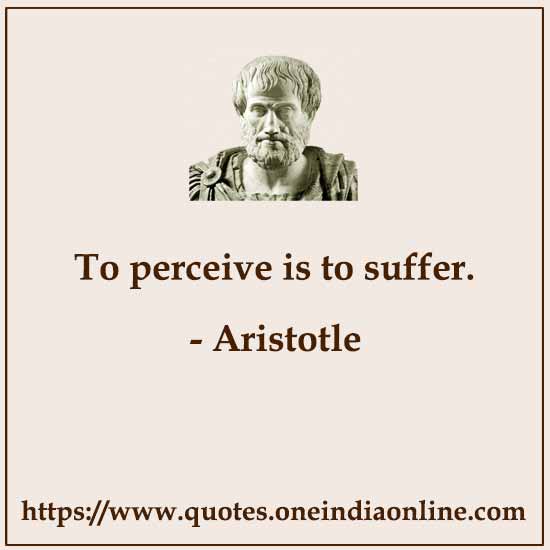To perceive is to suffer.
Aristotle Quotes in English

The quote "To perceive is to suffer" by Aristotle captures a significant truth about how humans experience the world. This statement implies that having the ability to see, hear, and feel means we will also encounter pain, discomfort, or suffering. The following details expand on the meaning of this quote:
First, perception means being aware of what is happening around us. This awareness comes from our five senses: sight, hearing, touch, taste, and smell. Aristotle highlights that perception is one of the key abilities shared by all living beings, especially humans, who can think about and understand what their senses show them. However, this understanding also brings the knowledge of suffering—both our suffering and that of others. By being aware of reality, we become aware of both joy and sorrow. Aristotle’s quote indicates that pain and suffering are a natural part of our experience in the world.
Next, suffering is an unavoidable part of life. Aristotle understands that living life and being aware means facing different kinds of suffering. Life is filled with challenges, loss, and pain. Merely by perceiving the world, we expose ourselves to these negative experiences. For example, we can see others in pain, which can make us feel empathy or sadness. We can feel our physical pain, becoming aware of injuries or discomfort. We also encounter emotional pain, like sadness or grief, through our perceptions. Thus, our awareness of the struggles of life brings a level of suffering that everyone experiences.
Additionally, Aristotle’s quote suggests that greater awareness makes us more vulnerable. The more we notice the world’s complexities, unfairness, and imperfections, the more we can suffer emotionally or physically. As humans, we can think about the future, remember our past, and understand others' feelings. This ability also raises the chance of feeling psychological pain.
Aristotle also notes a connection between perception and desire. Humans not only see and feel, but they also develop wants based on what they perceive. When the things we desire are out of reach, or our perceptions do not match our desires, we feel suffering. For example, when we see something we like, we may want it, but if we cannot have it, we might feel frustrated or sad. Similarly, seeing something unpleasant can lead to discomfort or anxiety. This link between perception, desire, and suffering is crucial to Aristotle’s view of human experience.
From a broader perspective, "to perceive is to suffer" speaks to the fundamental nature of human existence. Awareness brings the understanding that life is limited and ever-changing. Through perception, we recognize that everything in life is temporary, which can lead to feelings of existential distress. Aristotle’s ideas on how to live a good life, despite the reality of suffering, encourage individuals to cultivate virtues such as bravery, self-control, and wisdom. These qualities help people navigate the challenges of suffering, allowing for a meaningful and balanced life. Although perception may lead to suffering, people can learn to respond to it wisely.
Finally, this quote also highlights how our ability to perceive lets us connect with others. When we notice the emotions and struggles of those around us, we often feel their pain too, which fosters empathy. While this shared suffering can bring emotional hardship, it also helps us bond with others and strengthens our humanity. Through understanding and feeling the pain of others, we create deeper relationships and a sense of community, which can be a source of comfort amid suffering.